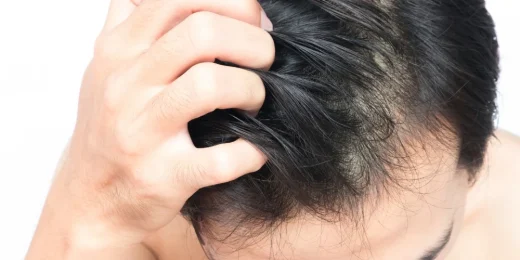Dealing with an itchy scalp can be frustrating and disruptive. Whether the irritation is due to conditions like seborrheic dermatitis, hormonal imbalances, or fungal infections, finding relief is essential. This guide explores common causes of scalp itchiness and provides natural and effective remedies that can help alleviate discomfort.

Understanding Itchy Scalp
An itchy scalp, also known as scalp pruritus, refers to persistent scalp irritation that leads to frequent scratching. Several factors contribute to this condition, ranging from skin disorders and fungal infections to allergic reactions caused by hair care products.
What Causes Scalp Itchiness?
Seborrheic Dermatitis
Seborrheic dermatitis is a prevalent skin condition that results in flaky patches, inflammation, and redness. It often affects oily areas like the scalp and is linked to excessive oil production and an overgrowth of a yeast-like fungus called Malassezia. This condition frequently leads to dandruff, further aggravating scalp discomfort.
Hormonal Changes
Fluctuations in hormone levels during puberty, pregnancy, or menopause can significantly impact skin health. These changes may alter oil production on the scalp, increasing the likelihood of irritation and conditions like acne or dryness.
Fungal Infections
Fungal infections, such as scalp ringworm (tinea capitis), can trigger redness, flakiness, and persistent itchiness. These infections are contagious and can spread through direct contact or by sharing personal items like combs and towels.
Allergic Reactions to Hair Products
Certain shampoos, conditioners, and hair dyes contain ingredients that may trigger allergic reactions, leading to scalp irritation, redness, and itching. Identifying and eliminating the allergen is key to preventing further reactions.
Determining the root cause of an itchy scalp is crucial, as each condition requires a specific approach for effective treatment.v
Natural Remedies for an Itchy Scalp

Apple Cider Vinegar
Apple cider vinegar is a powerful natural remedy known for its antibacterial and anti-inflammatory properties. It helps restore the scalp’s pH balance and reduces irritation. Mix it with warm water and use it as a post-shampoo rinse up to three times per week for the best results.
Coconut Oil
Rich in lauric acid, coconut oil has natural antibacterial and hydrating properties. Applying warm coconut oil to the scalp for 20 minutes before rinsing helps soothe irritation and combat dryness. This treatment is most effective when used once or twice a week.
Peppermint Tea
Peppermint tea contains menthol, which has a cooling effect that relieves itching and discomfort. Brew the tea, let it cool, and use it as a scalp rinse after shampooing once or twice per week.
Tea Tree Oil
Renowned for its antiseptic, antibacterial, and antifungal qualities, tea tree oil is a highly effective remedy for itchy scalps. Add 10 drops to a gentle shampoo or mix it with coconut oil before massaging it into the scalp. Let it sit for 15 minutes before rinsing.
Zinc Pyrithione Shampoo
Shampoos containing zinc pyrithione help regulate oil production and minimize dandruff-related irritation. Depending on your condition’s severity, consult a dermatologist for guidance on proper usage.
Salicylic Acid
Salicylic acid shampoos are effective in treating scalp issues caused by psoriasis and seborrheic dermatitis. This ingredient gently exfoliates the scalp, removing dead skin cells and buildup. Depending on the severity, it can be used daily or a few times per week.
Ketoconazole Shampoo
This antifungal shampoo is ideal for treating yeast-related scalp infections. It also has anti-inflammatory properties that reduce redness and irritation. Consult a dermatologist for recommended usage frequency.
Selenium Sulfide
Selenium sulfide is an antifungal treatment that slows the excessive growth of scalp yeast. It also mildly exfoliates dead skin cells. This ingredient is available in shampoos and lotions, but dosage should be determined by a medical professional.
Lemongrass Oil
With its natural astringent properties, lemongrass oil is an excellent scalp treatment. Adding two drops to your shampoo and massaging it into the scalp two to three times a week can help reduce itchiness while providing a refreshing scent.
Mineral Oils
Mineral oils create a protective barrier on the scalp, preventing moisture loss and helping to loosen psoriasis scales caused by dandruff or eczema. Massage the oil onto the scalp, leave it for an hour, then rinse with a mild clarifying shampoo.
A Healthy Diet
A diet rich in zinc, vitamin B, and healthy fats supports scalp health. Additionally, maintaining proper hygiene by washing hair with a gentle shampoo every other day helps prevent dryness and irritation. Consuming antioxidant-rich foods like fruits and vegetables can also reduce inflammation.
Baking Soda
Baking soda acts as a natural exfoliant and helps regulate oil production. Mixing it with water to create a paste and applying it to the scalp for 10 minutes before rinsing can promote a clean, itch-free scalp.
Banana and Avocado Mask
A blend of mashed bananas and avocado deeply moisturizes the scalp, alleviating dryness and irritation. Apply the mixture, leave it for 30 minutes, then rinse with cold water. Repeat this treatment two to three times per week.
Walnut Leaves
Walnut leaves possess natural anti-inflammatory properties that help soothe scalp irritation. Boiling these leaves to create a rinse can aid in reducing itchiness.
Amla (Indian Gooseberry)
Amla is rich in antioxidants and promotes a balanced scalp. Mixing amla powder with water to form a paste and applying it to the scalp can enhance scalp health while strengthening hair follicles.
Aloe Vera
Aloe vera gel provides instant relief for an irritated scalp due to its cooling and hydrating properties. Apply fresh aloe vera gel, leave it for 30 minutes, then rinse thoroughly.
Hibiscus Flower
Hibiscus flowers nourish the scalp while promoting blood circulation. Blending them into a paste and applying it to the scalp for 20 minutes can help maintain a healthy scalp environment.
While these home remedies offer relief for mild to moderate scalp conditions, persistent or severe symptoms may require medical attention.
When to See a Dermatologist
If your scalp itchiness lasts more than a week, worsens, or is accompanied by symptoms like pain, inflammation, or blisters, it is advisable to consult a dermatologist. They can assess your condition and recommend personalized treatments.
Conclusion
Managing an itchy scalp requires an understanding of its causes and implementing appropriate remedies. By incorporating natural treatments and maintaining proper scalp hygiene, you can achieve long-term relief. However, if symptoms persist or worsen, seeking professional medical advice is the best course of action.
Why Choose Erdem Hospital for Scalp and Hair Health?

Erdem Hospital stands out for its expert dermatologists, advanced diagnostics, and personalized treatments for scalp and hair issues.
✅ Experienced Specialists: Skilled dermatologists and trichologists provide effective solutions for dandruff, dermatitis, and scalp infections.
✅ Advanced Diagnostics: Cutting-edge scalp analysis and allergy testing ensure accurate diagnosis.
✅ Modern Treatments: From medical shampoos to laser therapy, tailored treatments address your specific needs.
✅ Patient-Centered Care: Personalized consultations and holistic approaches for long-term scalp health.
For expert care and lasting relief, trust Erdem Hospital!